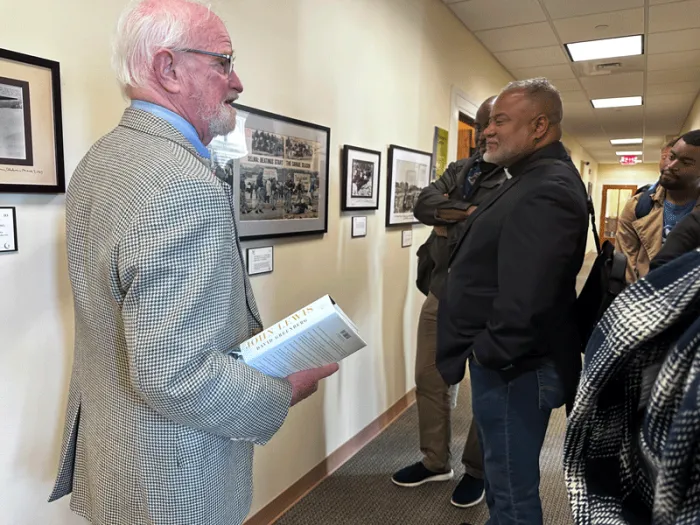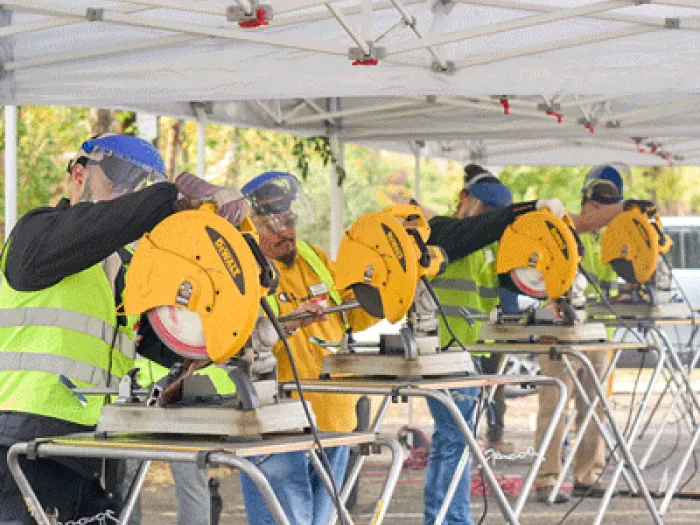Civil rights pilgrimage fosters appreciation and activism
Journey through Deep South was ‘humbling and moving’


LOUISVILLE — The perils of the civil rights movement and the need for continued racial healing and activism were apparent as the Presbyterian Peacemaking Program took a group on a humbling journey through the Deep South and to other historically significant spots.
The 10-day travel study seminar, spanning from Birmingham, Alabama, to Memphis, Tennessee, was held last May and June but continues to have an impact today.
“What we got to experience was how our country is still coming to terms with and remembering its own history and commemorating it and recognizing it,” said the Rev. Carl Horton, who manages the Peacemaking Program and co-led the seminar, “Exploring the Legacies and Lessons of the Civil Rights Movement in the U.S. South.”
Thirty participants were given a chance to visit some of the places where tragedies occurred during the civil rights movement as well as some of the sites where African Americans and their supporters pushed for the freedoms that many people take for granted today. Working for change in the 1950s and ’60s, the civil rights activists used a number of tactics, such as protests, boycotts and sit-ins, to push for new laws and shine a spotlight on the brutality of an unjust system that was separate but not equal.
“Throughout the seminar, something that was expressed repeatedly was the importance of the right to vote and the struggle African Americans have gone through to get that right,” said Josiah Rader-Hayes, a graduate assistant for athletic facilities and gameday operations at St. John's University in Queens, New York. “It has inspired me to be more active in local and national elections and to try to influence my peers to do the same.”

The Presbyterian Church (U.S.A.) travel study seminar was put together as “an opportunity to strengthen the resolve within our denomination and its congregations to confront, repent and atone for the historical harms done and to commit to dismantle the structures and systems of racism that persist today,” Horton said.
Confederate flags and other Civil War relics dotted the landscape as the group traversed the South by bus during the seminar, which was a collaboration with the Presbytery of Sheppards and Lapsley, St. Andrew Presbytery, the Presbytery of Mississippi and the Presbytery of the Mid-South.
For Terri Moon Jones, who’s part of Sheppards and Lapsley’s Anti-Racism Committee, the seminar reinforced the importance of persistence in the social justice arena.
“I did learn that I can’t give up or lose hope no matter what is happening in the world today,” said Jones, a co-leader of the civil rights seminar who serves as an elder with First United Presbyterian Church of Forestdale in Birmingham, Alabama. “I must still persevere in spite of how much or little change is happening as a result of the struggles and sacrifices of those who participated in the civil rights movement. I have a responsibility to ‘tell the true and correct story’ of this country’s history in spite of many trying to rewrite and cover up history.”
Along with visiting historical sites, such as the Mississippi unit of the Emmett Till and Mamie Till-Mobley National Monument site, the Edmund Pettus Bridge in Selma, Alabama, and the Lorraine Motel, where the Rev. Dr. Martin Luther King Jr. was assassinated in Memphis, participants listened to panel discussions and heard from people who lived through and participated in the Civil Rights Movement.
“What fascinated me the most was the different speakers we got to hear from,” Rader-Hayes said. “A lot of them were my age or younger during the civil rights movement, so it was very moving to hear their personal testimonies.”
Madeline Polhill, one of a handful of students from Princeton Theological Seminary in New Jersey who participated in the travel study seminar for course credit, also was touched by their words.

“Every story I heard along the course of this seminar helped me develop an ever-richer picture of human experience,” Polhill said. “I believe that learning from people's lived experiences is the best way to continue to grow into more empathetic and informed people and ministers. I am committed to listening and learning, especially to the stories of Black Americans, so that we might continue to strive towards a more just world that better reflects God's vision for humanity.”
Hearing the speakers also was impactful for Felipe Paz, another Princeton Seminary student who participated.
“I used to think that the picture that books, articles, and documentaries painted was already frightful and unbelievable, yet being there and hearing from civil rights activists and nowadays elders who told us what it was like to march when they were kids and what the environment was indeed like changed that,” said Paz, who is from the Republic of Colombia in South America. “It helped me see that I was not getting the whole picture; things were worse than they appeared, worse than media coverage showed, and how white supremacy still downplays the living reality suffered in those years and still tries to creep in and take hold of our times.”
Nancy Morris, a retired Minister of Word and Sacrament, said, “Hearing the stories of others who were present at these great turning-point moments in history — the Children’s Crusade in Birmingham, crossing the Edmund Pettus Bridge, working alongside Fannie Lou Hamer — was most impactful,” she said.
Morris added that both the stories she heard and the sites she visited enabled her “to comprehend more deeply the vast scope of the civil rights movement in these places within the Deep South, places I had never visited before. I was also able to appreciate the great efforts being made to preserve and proclaim this history, from the expansive Equal Justice Initiative sites in Montgomery to the small but passionate Mound Bayou Museum” in Mississippi.
For Edgar Hayes, who serves on the Committee on Representation and Racial Justice Partnership for the Hudson River Presbytery, one of the most impactful parts of the trip was visiting a new national park honoring Emmett Till, a 14-year-old Black boy who was lynched for allegedly whistling at a white woman in 1955 (his mother, Mamie Till-Mobley, also is honored).
“I didn’t know the full story of Emmett Till,” said Hayes, a Commissioned Ruling Elder and the father of Rader-Hayes. “It’s also different experiencing history from the physical place rather than a book or video. It was amazing and sad to walk the streets where the store still stands — yet hidden to the public — (and) to sit in the courtroom where the picture of his grand uncle pointing to Emmett’s killers was taken.”

Hayes, co-founder of the Freedom Farm Community in Orange County, New York, also got the opportunity to walk alone across the Edmund Pettus Bridge, the site of “Bloody Sunday,” where law enforcement officers beat and injured marchers in 1965. “With all the stops we made, my heart kept going back to how can so-called ‘Christians’ do such a thing?”
Hayes, whose home church is Otisville Mt. Hope Presbyterian Church in New York, invited his son along on the journey because “I wanted him to experience the truth of American history — the kind you don’t see in school,” the father said. “When folks tell of their lived experiences, that’s most important to me. You cannot deny someone’s lived experience the same way some people deny facts.”
Polhill said, “Being on this sacred ground was humbling and moving, a reminder of how close we really are to these terrible events, both geographically and temporally, and how far we still have to come as humankind.”
Having the opportunity to meet and get to know fellow participants was also meaningful, starting with going around the room to introduce themselves and to share a bit of their own family history in an opening exercise led by the Rev. James Ephraim.
“It was a profound way to start,” said Debra Harton Love, a co-leader of the seminar who serves as co-chair of the Anti-Racism Committee of the Presbytery of Sheppards and Lapsley. “The connections that were made, including meeting someone who shared the same surname as me, were incredibly powerful. Later, visiting a site in Montgomery where many of these surnames were listed further deepened that connection. It was a reminder of how our shared history ties us together, even across generations.”
Love, an environmental chemist, said the seminar also brought into sharp relief the lingering effects of poverty and systemic racism in the Black Belt of Alabama and the Mississippi Delta. “Seeing the scars of history through this enriched perspective reinforced my commitment to addressing these issues, especially in areas where the legacy of injustice remains so visible.”
She’s now integrating lessons from the seminar into her ministry and the work of the Anti-Racism Committee. This seminar “reaffirmed the need for strong, action-oriented work within our Matthew 25 church, especially in dismantling systemic racism and addressing poverty,” Love said. “I’ll continue using this experience to inspire others to understand the importance of history and its ongoing impact on our present-day struggles for justice and equality.”
The Presbyterian Peacemaking Program is one of the Compassion, Peace & Justice ministries of the Presbyterian Mission Agency.
You may freely reuse and distribute this article in its entirety for non-commercial purposes in any medium. Please include author attribution, photography credits, and a link to the original article. This work is licensed under a Creative Commons Attribution-NonCommercial-NoDeratives 4.0 International License.




